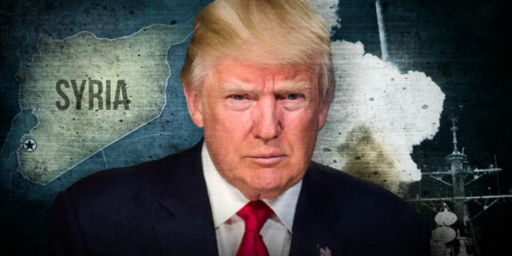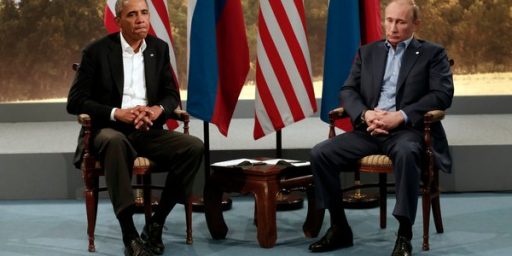Just This Once, John McCain Is (Partly) Right
John McCain is right that we shouldn't send ground troops to Syria, but his idea for increased U.S. intervention in the country's civil war is still too risky.
John McCain has been advocating for increased U.S. involvement in the Syrian civil war for nearly two years now, but even he has his limits:
An international coalition of troops should be ready to go into Syria to secure the country’s chemical weapons stockpiles, Sen. John McCain (R-Ariz.) said Sunday, warning that U.S. troops on the ground would only spark more Mideast anger.
But McCain said that putting troops in Syria is the “worst thing United States could do right now,” because the Syrian people are bitter and angry at the United States.
“I think that the American people are weary. They don’t want boots on the ground. I don’t want boots on the ground,” McCain said on NBC’s “Meet the Press.”
But McCain urged the Obama administration to take several actions in Syria, such as arming rebel groups or establishing a safe zone, steps he and other GOP hawks have long pressed
(…)
McCain, one of the most outspoken lawmakers on Syria, said Sunday that it should not matter whether Assad used chemical weapons. Even if they had not been used, McCain argued, Assad’s forces have committed atrocities already and killed tens of thousands.
McCain said that Obama’s red line gave Assad a “green light” to do everything short of use chemical weapons.
“Our actions should not be dictated on whether Bashar Assad used chemical weapons or not,” McCain said. “First of all, sooner or later he most likely would in order to maintain his hold on power.”
McCain is right on this first point at least. Putting American troops on the ground in Syria would be an incredibly bad decision. Not only would it inject us into the middle of a civil war where it’s unclear who the good guys actually are at this point, but it would also essentially mean that we were responsible for the post-Assad future of Syria just as we became responsible for the post-Saddam future of Iraq. As we’ve seen, that particular project has been less than successful, and the various factions that make up Syria are even more complicated that the Sunni-Shiite split that predominates in Iraq. Trying to keep the peace between Kurds, Sunnis, Shiites, and Alawaites, all of whom have reasons to fight each other, would mean committing ourselves to another long term military commitment.
What McCain doesn’t understand, or which he chooses to ignore, is that even the “limited” involvement that he’s in favor of poses the significant danger of sucking us further into the conflict in the future. In for a penny, in for a pound so to speak. Additionally,an “international coalition” is far harder to put together than McCain seems to think. Who is going to make up this coalition? The British? Somehow I don’t think the British public is going to want to bear that burden in the wake of their experiences in Iraq. The French? That poses the danger of reigniting passions from the days when France controlled what is now Syria and Lebanon after the post-World War I collapse of the Ottoman Empire. The Turks? That poses the danger of igniting regional tensions, not to mention Kurdish resentment in the areas of Syria where they predominate. In the end, the U.S. would end up having to shoulder a large part of the burden of this “international coalition,” and the mission would be seen as predominantly an American initiative notwithstanding whatever “international” window dressing may be put upon it.
In the end, there seem to be far more risks in intervening in Syria, even in the limited scenario that McCain proposes, than there are in not intervening at all.






I’m afraid Syria is a good guy-free zone.
@michael reynolds:
Sure seems like it. It’s unfortunate,
I’ve talked with Syrians living here in the US who desperately want their homeland to be free but even they recognize that there is a Hobson’s choice element to this entire civil war and that Syria may be no better off in a post-Assad world than it was in the years leading up to the outbreak of war in 2011.
The problem with your analysis, Doug, is that it leads us pretty quickly to a neo-isolationist policy. Its arguable that ANY foreign intervention could:
1. Have bad consequences
2. Draw us into deeper involvement.
For example, I can see you arguing in 1940:
“What Roosevelt doesn’t understand, or chooses to ignore, is that even the limited involvement of Lend-Lease risks sucking us into a deeper involvement in another fratricidal European war between two imperial powers. Why should we get involved, since we don’t even know who the good guys are at this point?” We don’t need to imagine such arguments, because Charles Lindbergh and other isolationists made exactly those arguments in 1940.
The right approach should be to ask, “Is it in our national interest to intervene in Syria?” The answer of many here would be a flat “No”, but neither I (nor the Obama Administration) see the answer as being so clear-cut. I can see considerable national interest in establishing a stable , non-hostile regime on a country bordering Turkey (a NATO ally) and Israel ( like it or not, a special ally). How can we get there from here? Hard to say, but doing nothing virtually ensures we WON’T get there.Doing nothing can have bad consequences, too.
The problem is much more complicated, because there are no good solutions. Saudi Arabia, known for financing extremist mosques all over the world, is arming the rebels. Doing nothing and allowing countries like Qatar and Saudi Arabia to have control over the rebels is ALSO a bad idea.
@stonetools:
Agreed. For several reasons, I would argue that the answer to that question is no.
I think it’s only in our interest to intervene in Syria if we expect the problems there to create difficulties that the allies in question can’t handle. I don’t see that happening myself, but I am willing to be proven wrong.
As a US citizen living over seas I know it is a hard issue. Do you bomb them in to the priomordial stage and then let them sort it out like we did with Germany or Japan or do we let them continue? I have to say it’s a tough call for the future of all of us.
@ Butch Leone
Well, Japan attacked us, and Germany declared war on us. Is your postion that America should commit genocide against people just because we don’t approve of them?
Stonetools, I disagree. Look at Iraq. Is it an ally? Ask yourself this: will Iraq do our bidding, or Iran’s. Iraq laughed at our request to stop Iranian flights to Syria. What makes you think we can establish a stable, non-hostile regime in the ME. Iraq..no, Afghanistan …nope. Where is the precedent?
I’m confused. Are we no longer supposed to invade Georgia to stop the Russian war machine? Because I don’t recall McCain ever calling that one off… Does this mean that we’re not all Georgians anymore? Are we all Syrians?
@stonetools:
Not wanting to go to war in a country that is marginally important to us when other tools are available does not make one “neo-isolationist”. It makes one smart.
Shorter McCain: “I’ve done the math and Syria does not have a sufficient supply of natural resources to make it worthwhile to get involved in a land war there.”
All that talk of Mid East anger, weary troops, etc. was apparently not a concern in Iraq.
Hmm. If this is where the hawkish side plants their flag (airstrikes, no ground troops), I’m actually hopeful that the intelligent choice – no military involvement – has a chance, despite Obama’s unforced error (“red line”).
@Doug Mataconis:
Well, let’s ask a more specific question. Is it in the US national interest to prevent a jihadist, Hamas-or Taliban-like regime taking over in Syria? The answer , IMO, is yes. It doesn’t take much foresight to conclude that a Hamas-like regime in Syria would be best avoided, if possible, because of knock-on effects in Israel, Turkey, Lebanon, and Jordan. If the jihadist regime, as is likely, starts persecuting Syria’s substantial Christian minority, there will even be conservative Christian pressure for military intervention.
I also object to the slippery slope argument ( One of Stonetools’ Rules: Slippery slope arguments are ALWAYS wrong). There are a wide variety of options between doing nothing and parachuting the 82nd Airborne into Dasmascus, and each of those options must be argued for and can be reversed, if they don’t work out.
Finally, we are ALREADY intervening in the Syrian conflict, since we are providing humanitarian relief to the Syrian rebels and refugees(According to Doug, we shouldn’t be doing even that, because SLIPPERY SLOPE!)Stonetoools’ Rules again : In our interdependent world, there is no such thing as no intervention: there is only dumb intervention and smart intervention. It was smart to provide humanitarian relief, because in doing so we recognize that Syrians are human beings and relieve pressure on host countries. The issue, really, is whether its smart to do more.
To answer that question, let’s look at Michael’s observation above:
The problem here is that if you look at history, in a revolution, the good guys don’t spontaneously rise to the top . Every revolutionary force starts out a mixed bag .That’s true even of our revolution. Our founding fathers (PBUT) included lots of “drivers of negroes”, as Samuel Johnson observed.The FFs also had lots of outside help from a Great Power (France).
All that said, I understand why people favor “non-intervention.” There isn’t a simple blueprint for success in establishing a non-hostile regime in Syria. (Another of Stonetool’s Rules: There are ain’t no such thing as a blueprint for success in foreign policy, but there are lots of blueprints for failure.)
I would start by doing more to encourage the good guys. The reason the bad guys dominate among the revolutionaries is that they are getting tons of military aid from Saudi Arabia, while the secularists get nothing. Maybe we can start quietly funnelling military aid to the secularists. We could also let secularists in the military know that if they defect, military support and immunity may be forthcoming.These are small-sacale, low level types of interventions, which we can pull back on if they don’t work out, and they may not be successful. But doing nothing paves the way for a jihadist takeover, which paradoxically enough, might create pressure for a much bigger intervention down the line.
@OzarkHillbilly:
@stonetools: true. but there is a difference between helping the UK, a long term US ally which had a giant economy in 1940, compared to getting our hands into syria, a country that offers no great benefit to US security/economic interests, i would say that a long war is america’s best option right now.
@michael reynolds:
And if I had to hand a white hat to anybody, right now it would be Assad, although I would probably throw up after doing so. He’s represents the Aliwites, Christian, Druze, Shia, and the better educated, westernized Sunni’s.